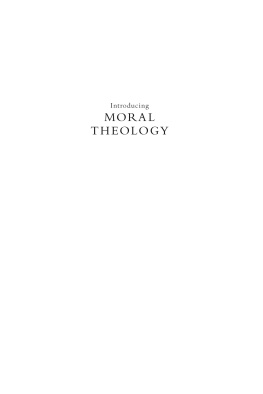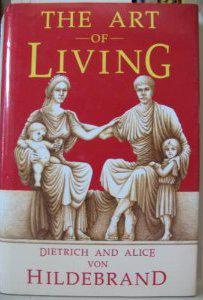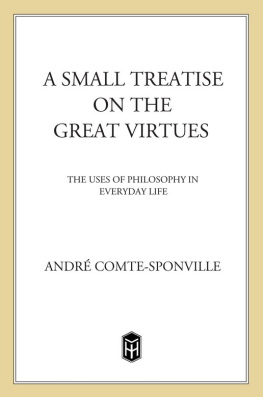St. Thomas Aquinas on the Cardinal and Related Virtues for Today
The Virtuous Life
( ST I-II, qq. 5570)
W e all aspire to be morally good and upright people. If we were asked what being morally good means, we might respond that it means doing good things and avoiding bad things. It means treating people fairly and decently. As Christians in particular, we might include obeying the commandmentsand, even more particularly as Catholics, we might add that being good includes following the churchs moral teaching. But if pressed to say more, we might begin to move from what morally good people do or dont do, to the kinds of attitudes that they have: caring, generous, balanced, and honest. And it is precisely in moving in the direction of such attitudes that we move into the realm of virtues.
It is one thing to do good on one occasion or from time to time. It is quite another to do good reliably and consistently. Even wicked people can do good things occasionally. Being truly goodas distinct from being able to do the right thing every once in a whileinvolves being able to do good in a regular and dependable way. Virtues are precisely the abiding dispositions or tendencies that enable us to be reliable and consistent in right action.
In fact, a virtuous person can be relied on to guide us to the good even when the right response seems difficult to determine. Lets say, for example, that we need some help in deciding on a specific course of action in a complex situation with a number of possible options. We say: Lets go talk to George. Hes always good at working these kinds of things out (that is, he has the virtue of prudence). Or we might be asking one another, Whats the fair thing to do here? Lets go ask Mary because she is all about fairness and has a good sense for thinking through such things (that is, Mary has the virtue of justice). How much should we drink at the party tonight? Lets watch to see what Marty does (that is, he has the virtue of temperance). These examples suggest that the people mentioned above have an abiding and reliable tendency to act in good ways. It is part of who they are. And their virtue is a reliable tool in the moral life for themselves and for those around them.
What is Virtue (and What is Vice)?
Aquinas defines virtues as habitual dispositions that lead us reliably to do the good. A virtue, he says, is a habitus which suggests that a virtue is a kind of habit. But it is not the mindless kind of habit that we can fall intohabits like tapping your fingers on a table while you wait, whistling when you walk along, or endlessly clearing your throat. A virtue is certainly not a habit like smoking. For Aquinas, a habitus is a kind of alteration in our natural abilities. The virtues that guide our moral lives are a kind of modification in our willthat is, in our ability to choose to act for the good in certain areas of our life. For example, we acquire the virtue of chastity by resisting one temptation after another, by choosing to act in a chaste manner when we could have acted otherwise, and picking ourselves up when we fail and starting again. Gradually, these repeated decisions and actions modify our will itselfour power to decideso that it becomes easier to be chaste reliably and consistently.
Virtues are similar to the kind of habitual skills that we learn with repetition. The tennis player or golfer practices the right swing, over and over again. At first, she must think through what she is doing: how she is holding the racket or golf club, the position of her feet and her elbows, etc. When she notices a mistake or when someone offers her a helpful observation, she makes adjustments and tries again. But she keeps repeating the action until it becomes second nature, and she can perform her skill well without thinking about it. Eventually, she no longer has to think about her swing at allexcept how she can make it better and better. The same could said about habituated skills like typing, playing the piano, dancing, or cooking. The virtues that guide our moral life are like these learned and practiced skills, except that virtues are habits that guide our actions to seek what is truly good.
The Catechism of the Catholic Church speaks of virtues as firm attitudes, stable dispositions, habitual perfections... that govern our actions, order our passions, and guide our conduct according to reason and faith (CCC 1804; see the Catechism , paragraphs 180345, for an overview of the virtues). Virtues make us firm and strong in being directed to and in doing the good. In fact, Saint Thomas says that they bring us smoothness, ease (power), and promptitude in accomplishing the good. For example, if I possess the virtue of temperance in eating, when I am faced with a tempting but unhealthy snack, I can resist it without struggle, resolutely, and without vacillation in making the right choice. We all know from experience that it is quite possible to see very clearly what we ought to do, but find ourselves too morally weak to do itor at least the right choice takes a lot of time and internal effort to accomplish. Virtues give us spontaneity and even a kind of joy in doing the good.
One of the principal characteristics of a virtue is that it is always directed to the good. The virtue of fortitude or courage enables us in a reliable way to overcome what stands in the way of attaining a good. The police officer, for example, shows courage in facing danger to protect lives. When, on the other hand, someone is able to face obstacles to accomplish evil, it may look like courage, but it is not. It is a firm resolve and fearlessness in pursuit of selfish or evil gain, but it is not courage. Thieves who are willing to face threat of arrest or the possibility of an armed homeowner in order to steal certainly possess an ability to face danger, but they do not possess the virtue of courage. In the same way, the virtue of prudence enables us to consistently choose well; but it is craftiness or shrewdness, not prudence, to know how to efficiently and effectively do evil.
The virtues aid us in doing good and help us to do so consistently. Once we have them, they endure within us unless we begin to act against them. It is possible, for example, to have the virtue of justice, but lose it by one unfair, unjust action after another. It is not usually just one act of failing to respect what is due to others that undoes the virtue of justice, but many such acts over time. In the end, virtues do not determine our action or prevent us from acting against them. They do, however, make it more unlikely and even difficult to do so.
Habitus is a vice, as well. It is the opposite of a virtue. A vice is a habitual disposition or an abiding tendency to do evil. Like moral virtues, we build them up, one decision at a time. Once we have them, they give us smoothness, ease, and promptitude in doing evil. The vice of dishonesty grows one decision after another, progressing from little white lies to more significant untruths, from occasionally to regularly. Eventually, telling lies can be like second nature. Like virtues, vices do not determine my actionI still have the possibility of choosing rightlybut it will be far more difficult to do so. This explains why we can sincerely repent, for instance, of a vice like backbiting. We go to confession and receive absolution and divine help to do better. But if we truly had a vice, it remains in us. It is true that God is helping us, but at a natural, human level, that modification in my will (the habitus ) remains there. Sadly, I will struggle to avoid acting on that particular vice until, one temptation resisted after another, I have overcome it.












